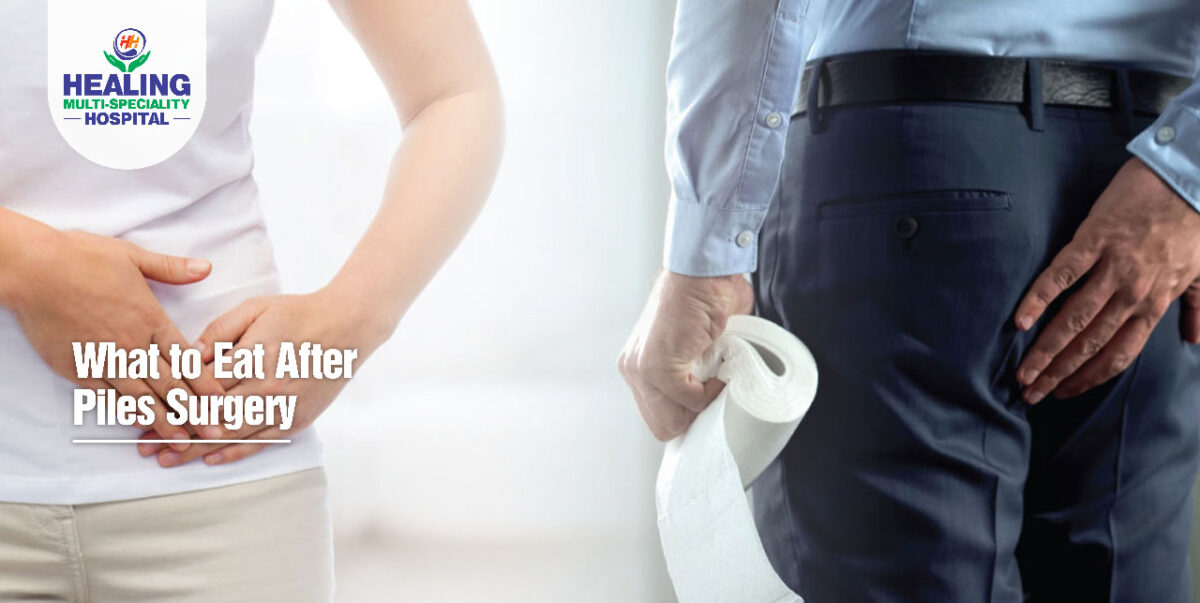Piles or haemorrhoids are common problem faced by people worldwide. Most of the times, piles may resolve on their own but surgery may be required in some cases. In such a case, it is important to take care of your diet after a piles surgery so that the recurrence of piles can be prevented.
| Contents: What is Piles? Recovery Time after Piles Surgery Diet after Piles Surgery Importance of Fibre in Diet |
What Is Piles?
Piles are inflamed and swollen clusters of tissue and veins. They can be small or large and can be located within or outside the anus. Chronic constipation, chronic diarrhoea, lifting heavy weights, obesity, pregnancy, or straining while bowel movement are some of the common causes of piles. Itching and bleeding are common symptoms of this problem.
Looking for Piles treatment in Chandigarh? Go no further: https://healinghospital.co.in/general-surgery/

Recovery Time after Piles Surgery
Most patients feel better after one week of piles surgery, especially if their bowel movements are soft or slightly loose. If the stool becomes hard or if you have to struggle to pass stool, the pain can be severe. Stool softeners, as well as a high-fibre diet, can be beneficial during this time.
While you can start doing normal chores after a week, all the rest activities can be resumed two to three weeks after the surgery.
To cope up with the recovery, you may be prescribed over-the-counter medications such as ibuprofen and stool softeners to help with the pain. The doctor may also recommend you to take a sitz bath or apply ice-packs to the anal area to reduce swelling and pain.

Diet after Piles Surgery
After the surgery, you should not eat or drink anything for around 4 hours. After this time period, start with liquids and a bland diet such as plain rice, bananas, apple sauce, etc.
To help alleviate discomfort, your doctor will give you some dietary guidelines for a few days to soften the stool. You will also be instructed to drink plenty of water during the recovery period. You should drink at least 8-9 glasses of water every day for quick recovery.
To allow your wound to heal properly, you must limit stool movement for the first few days. Therefore you should consume a low-residue diet. This diet includes foods that won’t bulk up your stool or cause large bowel movements.
This diet consists of low-fibre foods that help to reduce bowel movements. Following piles surgery, you can include the following low-residue foods in your diet:
- Any milk product, but no more than two cups per day
- Strained vegetable juice
- Fresh fruit juice
- Soft melons
- Bananas
- Peeled potatoes
- Fully cooked vegetables
- Fully cooked meat, poultry, and seafood
- White bread, white rice, pasta, and cornflakes
- Comfort foods such as chicken noodle soup and meatloaf with mashed potatoes
After a few days of recovery (usually around 3-4 days), you can resume normal eating habits and gradually increase your fibre intake.
Importance of Fibre in Diet
As fibre cannot be digested by the human body, it adds weight to the stool, making it easier to pass. This leads to less straining, more consistency, and a lower chance of haemorrhoids. Along with this, increasing your fibre intake can also help you feel fuller for longer, improve your heart health, and control your blood sugar levels.
It is fit to consume around 21 to 38 grams of fibre in a day. Rich sources of fibre include strawberries, pears, oranges, broccoli, spinach, potato (with skin), carrot, kidney beans, chickpeas, almonds, peanuts, flaxseeds, etc.
It should be noted that fibre should be added to the diet gradually or else excess it can lead to problems such as constipation, gas and bloating. While consuming fibre, make sure to drink an adequate amount of water for the stool to pass easily.
For expert advice on Piles treatment in Chandigarh, Call Now:

























